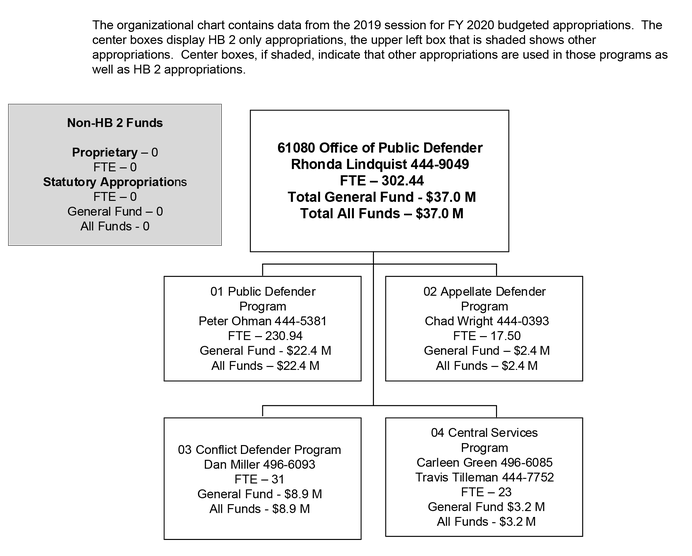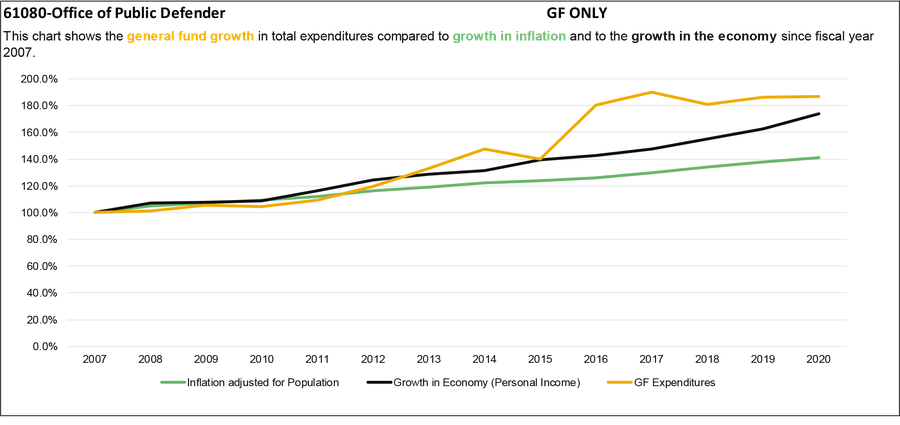Montana State Legislature
Office of State Public Defender
The primary mission of the statewide public defender system is to provide effective counsel to indigent persons accused of crime and other persons in civil cases who are entitled by law to the assistance of counsel at public expense.
Services are provided by a combination of state employees and attorneys contracting with the state. In general, state employees provide services in populated geographic areas where the majority of the cases occur and contracted attorneys are used in less populated geographic areas. Contract attorneys may also be utilized in situations that create a conflict of interest for attorneys on staff. State employees include attorneys, criminal investigators, and legal secretaries. Services are broken among 11 regions along with an office for major cases and an appellate office. In addition, a conflict office manages cases where conflicts exist between represented parties in the same legal action.


This report includes a series of charts that compare expenditure growth to the growth in the economy and growth in inflation adjusted for population. Montana statute, 17-8-106, MCA, recommends using growth in personal income for comparison purposes. Personal income is a measure for growth in the economy. Comparing growth allows financial planners to consider past and future demands in services or changes in revenues.
The following list discusses in more detail the inflection points on the charts:
- The Office of Public Defender was established in 2006 through SB 146. 5.50 FTE in 2006 and 20.00 FTE in FY 2007 were added to manage and administer the system. 3.00 FTE and $205,261 general fund were added to the Appellate Defender agency beginning in FY 2007.
- In FY 2007 1.50 FTE and $8.1 million general fund were transferred from the Judiciary and 42.00 FTE attorneys and 23.75 FTE support staff were transferred from local governments. In the 2009 biennium funding was $5.6 million greater than in FY 2007 including an additional 102.25 FTE as outlined in the strategic plan adopted by the Public Defender Commission for anticipated caseload increases.
- The Office of Public Defender was $8.4 million higher in the 2015 biennium due to contracted services, attorney career ladder adjustments to address attorney turnover, and funding for 8.00 FTE to address caseload impacts.
- In FY 2016 and FY 2017, there was an increase of $11.2 million due to the approval of 26.40 FTE to address caseloads, a market adjustment for staff, increase in funds for contract attorneys, and 1.00 FTE to address caseload issues in the Appellate Defender.

General fund
As shown in the above chart, the Office of the Public Defender’s general fund growth exceeds growth in the economy beginning in 2013. The agency has requested supplemental appropriations every year except FY 2008, FY 2012, and FY 2016. Supplemental appropriations were used to cover shortages in the following areas of the budget: costs of the new system exceeded the level anticipated, anticipated budget shortfalls, contract costs, and the cost of modified FTE attorney positions during the biennium.
State special revenue
The amount of state special revenue the agency receives accounts for a small percentage of the overall budget; even a small change in the amount of funding accounts for a large percentage fund change. In the past, the Office of Public Defender received state special revenue from defendant fees as a reimbursement for services. As of 2019 biennium, the Department of Revenue is collecting these fees and the Office of Public Defender is entirely funded by general fund.
Legislative Changes
The following legislative changes adopted by the 2019 Legislature include:
- HB 3–This bill appropriates $2,039,487 to the Public Defender Division and $5,354,536 in the Conflict Coordinator Division in fiscal year 2019
- HB 73 –This bill revises the laws related to the classification of certain employees of the Office of the State Public Defender by moving them from exempt to classified effective July 1, 2019. Currently, three division administrators are exempt, and one is not. There are 11 exempt regional managers in the Public Defender Division and there are the equivalent of regional managers in the Conflict Defender Division who are non-exempt. Other agencies do not have similar exempt positions
- HB 192 –This bill revises laws related to privacy in communications. The potential fiscal impact includes an increase in misdemeanor cases for privacy in communications violations
- SB 147 –This bill revises laws concerning human trafficking and sex crimes to protect victims. SB 147 will increase the number of cases handled by the Office of the Public Defender and increase case costs related to felony and misdemeanor cases
Major legislative changes adopted by the 2017 Legislature include:
- HB 133—This bill eliminated the possibility of jail time on several misdemeanor offenses and instituted mandatory minimums for sex offenses against children aged 12 or younger. These changes affect expenditures for the Office of the Public Defender by reducing caseload
- HB 59—This bill removed court requirements for putative fathers in most cases and reducing the number of dependent and neglect cases where the Office of Public Defender (OPD) is appointed for representation
- HB 77—This bill reorganized the Office of Public Defender. The bill:
- Allowed for a Director position that will be hired by the Department of Administration
- Created an Advisory Commission attached to the Office of State Public Defender
- Removed the allocation of the former commission to the Department of Administration
- Established a quarterly meeting expectation and allowed for special meetings to be called when required o
- Allowed the Director position to be named in place of a Chief Public Defender and Chief Appellate Defender for certain duties o Established definitions related to the Office of the Public Defender
- Clarified certain duties for the Division Administrator and the Advisory Commission
- Mandated any unencumbered state special revenue be transferred to the general fund by August 1 of each year
- Created further direction for eligibility determination of indigence o Outlined the duties of an administrator position
- Provided transition instruction to the Advisory Commission and the Department of Administration
The following legislative changes adopted by the 2015 Legislature include:
- HB 2—This bill designed the appropriations for OPD, including the base budget, as one-time-only. As such the budget for the 2019 biennium was built from a zero base.
- HB 627—This bill provided for a study of the operations of OPD to develop a long-term plan to allow OPD to provide effective assistance of counsel to those that qualify
- HB 143—This bill suspended a defendant’s obligation to make payments for costs of assigned counsel during the period a defendant is incarcerated
- SB 244—This bill created a study for sentencing practices and policies
The following legislative changes adopted by the 2011 Legislature include:
- HB 96—This bill allowed OPD to recover the costs of representation in probate and involuntary commitment cases if the respondent was determined to have financial ability to pay for a public defender and the judge ordered the respondent to pay
- SB 15—This bill created a misdemeanor crime of aggregated driving under the influence, increasing the number of cases requiring OPD to provide representation
- SB 187—This bill modified several provisions of the Montana Public Defender Act by:
- Eliminating the requirement that the Chief Public Defender carry a caseload
- Prohibiting the contract manager from carrying a caseload
- Providing for separate staff for the Public Defender Commission (commission) to be added when enough state special revenue was collected to support the positions
- Modifying per case charges for the cost of the counsel
- Specifying that the commission establish and oversee a Conflicts Office with a Conflicts Manager
- Requiring that applicants for services submit notarized affidavits of indigence
Click the double-sided arrow in the lower right corner of the image below to enlarge the graphic. Then, click the box next to the agency you want to see. To minimize, click Esc.
Legislative Studies
Law & Justice Interim Committee work
Audit Reports
Financial Compliance Audit - Office of the State Public Defender - October 2018
Performance Audit - Public Defender Workforce Management - September 2020
Legislation
HB 183, Eliminate requirement that offenders pay public defender fees
SB 69, Revise settlement laws
Gov. Gianforte 2023 Biennium Budget - Office of State Public Defender
2023 Biennium Executive Summary - Office of State Public Defender
Agency profile information provided by the Legislative Fiscal Division.
